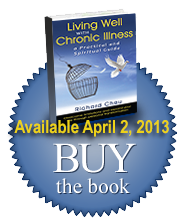 “Achieving mindfulness is important for everyone but especially for the chronically ill patient. A diagnosis of a chronic condition at any age, such as cancer, diabetes, stroke, neurological disease, or debilitating injury, unleashes a flood of negative emotions and concerns that can overwhelm and immobilize the patient” says author Richard Cheu, author of Living Well with Chronic Illness: a Practical and Spiritual Guide. Typical emotions, including fear, grief, anxiety, anger and despair, only make things worst. He defines mindfulness as “a calm mind and a peaceful heart” which can counteract these concerns and improve the patient’s mental, physical and spiritual health. It gives the patient courage and strength to focus on achieving the important things in life.
“Achieving mindfulness is important for everyone but especially for the chronically ill patient. A diagnosis of a chronic condition at any age, such as cancer, diabetes, stroke, neurological disease, or debilitating injury, unleashes a flood of negative emotions and concerns that can overwhelm and immobilize the patient” says author Richard Cheu, author of Living Well with Chronic Illness: a Practical and Spiritual Guide. Typical emotions, including fear, grief, anxiety, anger and despair, only make things worst. He defines mindfulness as “a calm mind and a peaceful heart” which can counteract these concerns and improve the patient’s mental, physical and spiritual health. It gives the patient courage and strength to focus on achieving the important things in life.In his book, CHEU shows the reader how to overcome limiting thoughts and feelings and expand life beyond chronic illness. Specific actions to achieve mindfulness include:
- Take charge of your emotions and thoughts
- Let go of negative emotional baggage that is holding you back
- Develop a new perspective and plan for the future
- Use your illness for personal transformation.
A chronically ill patient, like a wounded warrior, is often times in shock and unable to take even the smallest step forward. If, however, the patient will ask, “What do I do now?” others will reach out to help. If it takes a proverbial village to raise a child, it takes a virtual army to support a patient with a chronic condition. The patient’s helpers can includes an ever-changing cast of healthcare providers (doctors, therapists, nurses, aides, and social workers), support groups, caregivers, family members and friends.
Achieving mindfulness is not a do-it-yourself project. The patient who says “I’ll take care of myself” is like a ship’s captain without a crew. The ship is headed for a disaster. The path to mindfulness begins with an openness to change and a willingness to acknowledge that accepting help is a sign of strength and not weakness. Only then can others reach out and accompany the patient on a journey to a calm mind and a peaceful heart.
The Author
Richard Cheu is an author, ordained deacon and hospital chaplain in the Archdiocese of New York, stress-management consultant, and caregiver. He provides pastoral counseling at Bellevue Hospital, the Visiting Nurse Service inpatient hospice, and other New York City medical facilities. He formerly was a neurophysiologist and Emergency Medical Technician.
His new book, Living Well with Chronic Illness: a Practical and Spiritual Guide, will be released on April 2, 2013. For additional information visit www.ChronicLivingWell.com
Please comment below with your experience of
Living Well with Chronic Illness by Richard Cheu.



